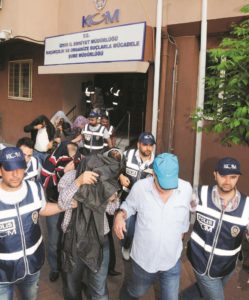Abdullah Bozkurt/Stockholm
Tanju Bilgiç, Turkey’s newly appointed ambassador to Russia, was identified by a crime syndicate as a valuable asset for obtaining classified foreign ministry documents including a confidential letter that detailed an exchange with Russian Foreign Minister Sergey Lavrov, in return for sexual favors, an indictment filed in March 2013 in Turkey revealed.
According to the case file, Bilgiç supplied about a dozen highly classified documents on Russia, Greece and Cyprus to the syndicate when he was head of the Cyprus-Greece desk at the foreign ministry between 2008 and 2011. He later served as consul general in St. Petersburg.
Bilgiç’s profile, prepared by the syndicate, stated that he required “extra special care,” suggesting that he needed to pampered by women working for the syndicate. The profile listed each and every document that he handed over to the syndicate, exposing Bilgiç to possible criminal charges for breaking multiple Turkish laws on national security.
A review of the case file indicates that his name appeared in an encrypted file named Pandora on a seized hard drive that was found during the execution of a search and seizure warrant at the summer home of the main suspect, Bilgin Özkaynak, a far-right figure and crime syndicate boss.
Profile note about Tanju Bilgiç that was kept by the crime syndicate was entered into evidence as part of an indictment filed with a court in Turkey:
The encryption was cracked by IT specialists authorized by the court, and the content of the file revealed the names of assets, operatives, marks and a huge archive of secret military and government documents obtained through honey-trap and other schemes.
The evidence submitted to the court showed that Bilgiç was connected to a suspect named Aylin Muslu, a then-21-year-old prostitute who went by the assumed of Merve. The information notes about Bilgiç were passed to the gang by her, most likely after intimate encounters. In a statement to the prosecutor’s office during the investigation, Bilgiç denied knowing the woman, but his official testimony for the court during the trial was not possible because he was listed at an overseas address at the time.
Bilgiç had for years served as the ministry’s spokesman but never appeared in court.
Internet archive Wayback Machine shows that Muslu had run sexually explicit ads on several escort sites, suggesting that the syndicate used web advertising for its operatives to lay a trap and identify and develop targets for the acquisition of confidential documents and the collection of sensitive information.
Archived web page of Aylin Muslu, a prostitute who obtained classified documents from a Turkish diplomat and passed them to a crime syndicate:
The documents listed as obtained from Bilgiç in the case file included documents, some marked secret and processed on foreign ministry computers, two maps, a letter and a draft speech for the foreign minister to be delivered at a high-level intergovernmental meeting in Iraq. One document, saved in .jpg format and stored in the syndicate’s archive, detailed a letter involving an exchange with Russian Foreign Minister Lavrov.
The discovery of Bilgiç’s involvement in the organized crime syndicate was made after the police in Izmir received a tip on August 10, 2010 that informed the authorities about a sex trafficking and human smuggling network that was involved in blackmail, prostitution, privacy violations and other criminal activities. The case did not appear to be high profile in the beginning and was handed over to the local police.
Police briefed the prosecutor’s office on the tip and submitted preliminary research on the people named in it. The prosecutor ordered the organized crime unit on October 26, 2010 to investigate the claims and suspects named in the whistleblower’s account. As the investigation moved forward, authorities were shocked to find out how the gang infiltrated sensitive military bases, recruited and developed assets and enlisted a number of government officials from practically every agency and ministry.
List of documents that were leaked to the crime gang by Turkish diplomat Tanju Bilgiç, according to the indictment:
The report, dated December 3, 2010, shows the police investigated the claims made in the tip and identified nine people, including Russian and Belarusian women, who were involved in the gang. The report indicated that the gang forced women to engage in sex and seized the passports of foreign women who were lured to Turkey and compelled to work in honey trap schemes. The gang recorded the sexual encounters in order to blackmail government officials.
The investigators had worked on the case for two years, obtained wiretaps from the courts and ran surveillance on suspects to uncover the network. It turned out the gang was much more than a sex trafficking network and resembled more of an espionage group collecting top secret information from various government and military officials through honey traps, sexual favors or blackmail.
Among the thousands of pages of secret documents were classified NATO and FBI documents that were shared with the Turkish government as a member of the alliance.
The first wave of arrests was launched on May 9-10, 2012 at the order of prosecutors, and more criminal evidence was gathered from the homes and offices of suspects during the execution of search and seizure warrants. The police detained 28 people in the first wave including nine active duty military officers.

According to an internal memo submitted to the Smuggling and Organized Crime Department (KOM) in Ankara on May 11, 2012, a copy of which was obtained by Nordic Monitor, investigators drew up profiles of the detained suspects and the content of the materials seized from the suspects.
The indictment revealed how NATO and US security was compromised. For example, NATO documents seized from suspect Narin Korkmaz during the execution of a search warrant identified Alparslan Yücel Soysal, also a suspect in the case, as revealing in detail the assets and capabilities of the Explosive Ordnance Disposal (EAD) units operating in every NATO member state. The note next to his name clearly singles out Russia, China and Iran as potential clients for these documents.
A suspect named Bülent Karaaslan, a bomb expert, supplied secret US and NATO directives in bomb-making and bomb-diffusion techniques to the spy ring. Suspect Aydın Şit, an air force officer, handed over FBI bomb-making analyses to the gang that explained, among other things, how to make improvised bombs manually and where in the car these bombs should be planted. Suspect Ersin Kapucu, an air force pilot, was identified as an important source for electronic warfare data and information on how it was used by the Turkish Air Force (THK) and NATO. He supplied 22 Power Point presentation files dated 2009. A note in his file says he was soon expected to supply passcodes, which the gang believed would be beneficial.

The gang obtained from a mark named İsmail Demir a hard copy of top secret details on AIM-120 missiles used on Turkish F-16 fighter jets. The note recommends that he be rewarded for supplying this sensitive information. Another mark named Andaç Keskin, an officer at the field corps school of engineering in İzmir, was identified as an important asset in hooking up with NATO officers. The note about him says he knows many NATO officers and coordinates logistics for them. It says Keskin operated out of the Aktur Hotel in İzmir, where many NATO officers stayed, in a room fitted with surveillance equipment.
Suspect Nuri Dereli, a flight lieutenant, supplied the gang with a sensitive file titled “Tur_AEM_F16.pdf,” which is 954 pages long in English and classified as “Secret Releasable to USA, TUR.” It details technical, tactical and procedural data for F-16s. The note attached to this file says it should not be obtained by anybody else. It even warned that when a file of a similar nature was previously leaked, it created problems between Turkey and the US. “I repeat it should not be leaked in order not to experience similar problems with the US,” the note added.
Similarly, suspect Okay Yalçın, an air force officer, leaked sensitive information on US-made Hawk medium-range surface-to-air missile systems, including a 24-page secret document titled “60G-2-2-70 Hawk Passive Engagement System.pdf.” Another set of documents seized from suspect Saygın Özdemir details performance reports of pilots assigned to the 151st squadron and their evaluations on war preparedness. A document titled “F-1” reveals frequencies and positions pilots use with ground control at the 5th Air Base and was described as vital information that cannot be allowed to be leaked to the enemy in wartime.
Another document explains how the ammunition loaded on F-16s should be used and under what conditions. It says this document cannot be transferred to any country other than Turkey and the US. A document leaked by Gökhan Gülbalar explains the nuts and bolts of a signal intelligence system named Milsis-23u, used within the General Staff’s Electronic Systems Command (GES), the military’s most comprehensive and top secret communications interception unit.
The criminal case against the gang members was quashed by the Erdoğan government, and all suspects were let go. Many returned to their duties in the Turkish military, advancing in the ranks despite their controversial records.
Prosecutors, judges and police investigators who uncovered this massive espionage ring were punished either by dismissal or arrest on trumped-up charges.












